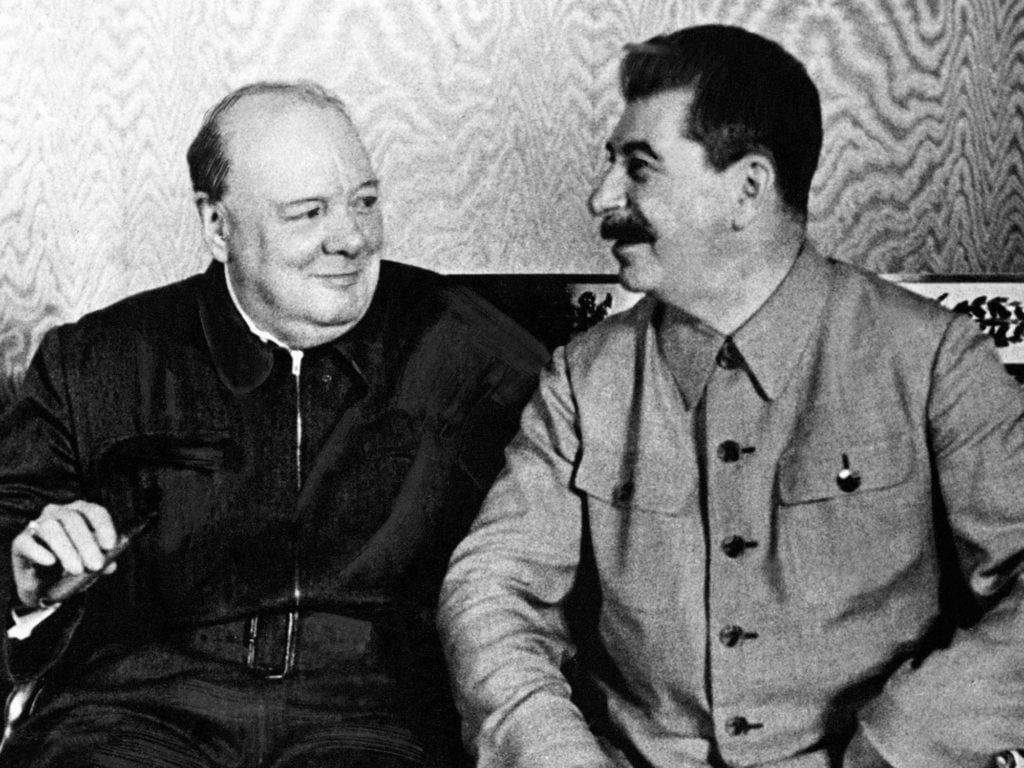The phrase of the British Prime Minister can often be found in literature and the press. In recent decades, it has become widespread in the rhetoric of some patriotic citizens. We checked whether Winston Churchill actually said this.
The quote appears in such an authoritative series as “The Lives of Remarkable People.” In the afterword to the book “Churchill” by François Bedarid, historian Yuri Emelyanov writes: “And so on December 21, 1959, W. Churchill made a statement in the House of Commons that again surprised the world. It seemed that Churchill was crossing out all his post-war statements that he had made regarding the USSR and its leaders, and was returning to his assessments of the times of military cooperation with the USSR in 1941–1945. His speech on the occasion of the 80th anniversary of the birth of I.V. Stalin is very expressive: “It is a great happiness for Russia that during the years of the most difficult trials the country was led by the genius and unshakable commander I.V. Stalin. He was the most outstanding personality, impressing our changing and cruel times of the period in which his whole life took place. <...> Stalin was the greatest dictator, unparalleled in the world. He took over Russia with a plow and left it equipped with atomic weapons. No, no matter what we say about him, history and peoples do not forget such people."
Many other sources also refer to the pathetic speech in the House of Commons. First, let's try to understand when this quote appeared in print. Let us say right away that in English-language literature in connection with Churchill it is extremely unpopular and is found mainly in recent years - for example, in the book “Russia after the Cold War", published in 2014.
According to researcher Konstantin Dushenko, the quote gained popularity in the USSR thanks to public figure Nina Andreeva and her famous article “I can’t compromise my principles” (“Soviet Russia”, March 13, 1988). Moreover, just three weeks later a refutation appeared in the Pravda newspaper: “The panegyric to Stalin given by her [Andreeva] does not belong to Churchill at all. The famous English Trotskyist I. Deutscher said something similar.” Let us note that in 1985, in the magazine “Moscow”, even earlier, one could find a slightly different version of the phrase: “It seems that Churchill said about Stalin and at the same time about Russia, that Stalin accepted Russia in bast shoes, and left it with an atomic bomb.”
As for Deutscher’s article, if Dushenko is to be believed, on March 6, 1953, the day after Stalin’s death, an obituary signed by Isaac Deutscher appeared in the left-wing newspaper Manchester Guardian. It said: “The essence of Stalin’s historical achievement is that he got a Russia plowed with wooden plows and left it equipped with nuclear reactors.” The quote was later included in Deutscher's book Russia after Stalin (1953) and even in the Encyclopedia Britannica (Volume 21, 1964). The article “Stalin” is signed here with the initials I.D. (Isaac Deutscher).
The above actually happened, but this is not the first time the quote has appeared in the press. On December 21, 1949, on Stalin’s 70th birthday, The Guardian newspaper published a congratulatory article by the same Deutscher, in which the latter wrote: “Perhaps the historian of the future, summing up the results of Stalin’s reign, will write that he accepted Russia plowed with wooden plows and left it equipped with nuclear reactors.”

As we see, four years later he himself became the “historian of the future” about whom Deutscher wrote. And the only words Churchill spoke during a meeting in the House of Commons in 1959 were Gratitude for congratulations on my recent birthday (November 30, 1959). These words are not found in other transcripts of his speeches, or in the memoirs of any of his contemporaries.
Thus, the real author of the quote about the plow and the atomic bomb is the British Marxist, historian, biographer of Stalin and Trotsky Isaac Deutscher. Churchill never uttered these words.
Incorrect quote attribution
Read on topic:
1. http://www.dushenko.ru/quotation_date/121233/
2. https://www.nemaloknig.net/read-107032/?page=104
3. http://revolucia.ru/nmppr.htm
4. https://marxists.architexturez.net/archive/deutscher/1953/russiaafterstalin.htm
If you find a spelling or grammatical error, please let us know by highlighting the error text and clicking Ctrl+Enter.






